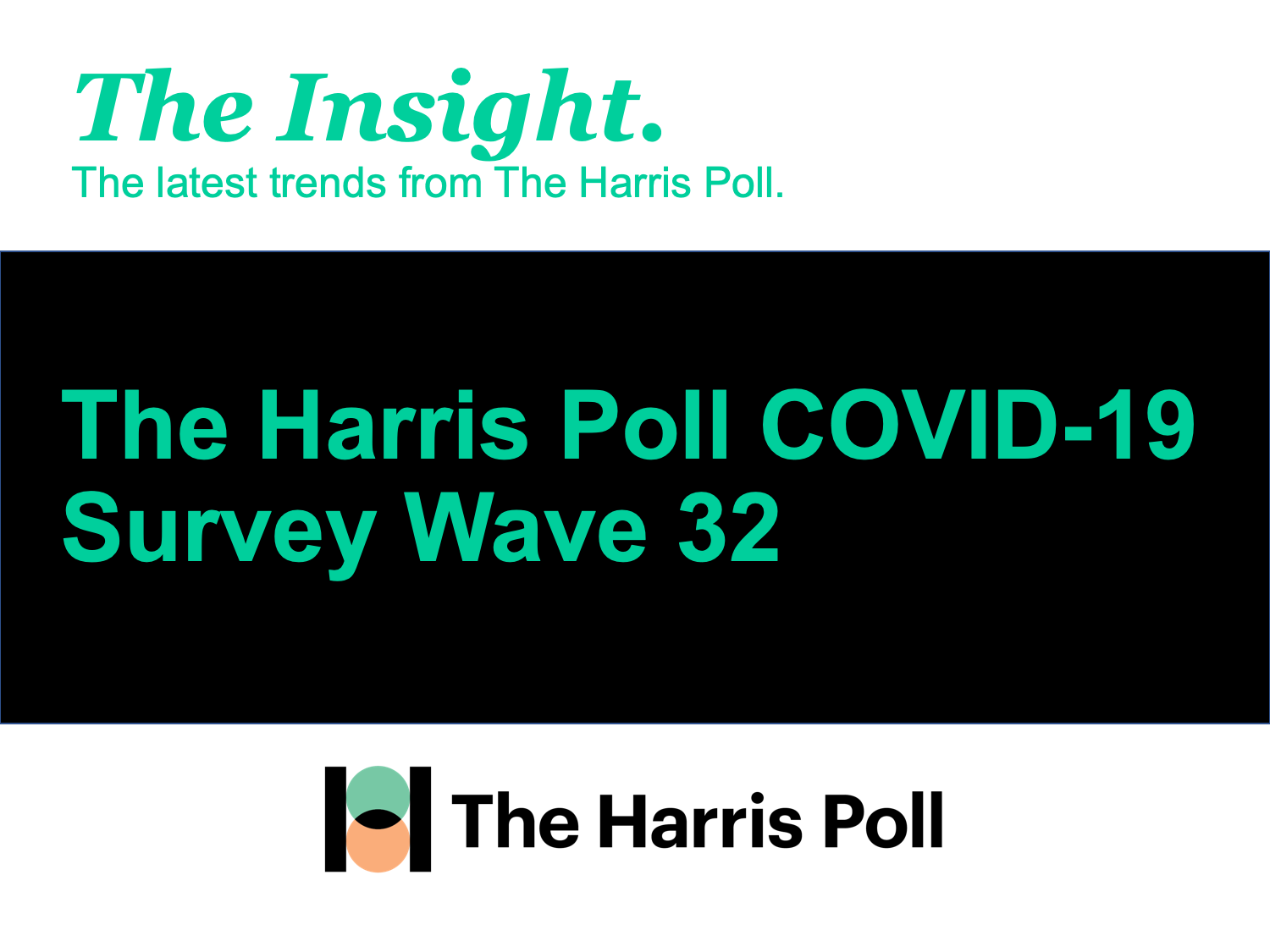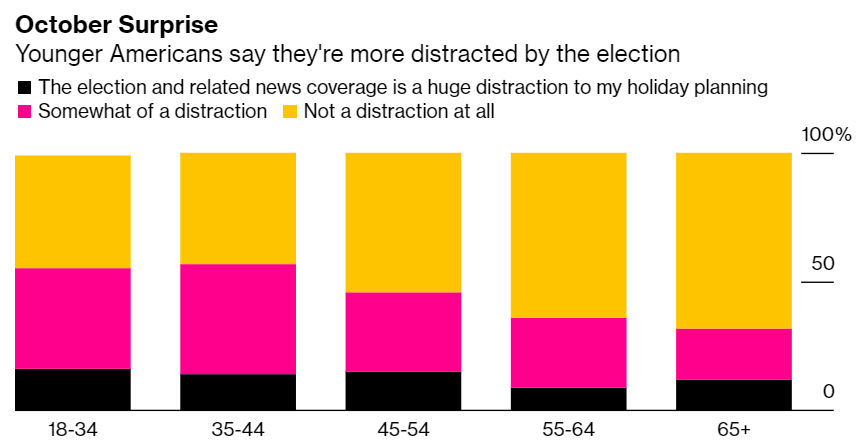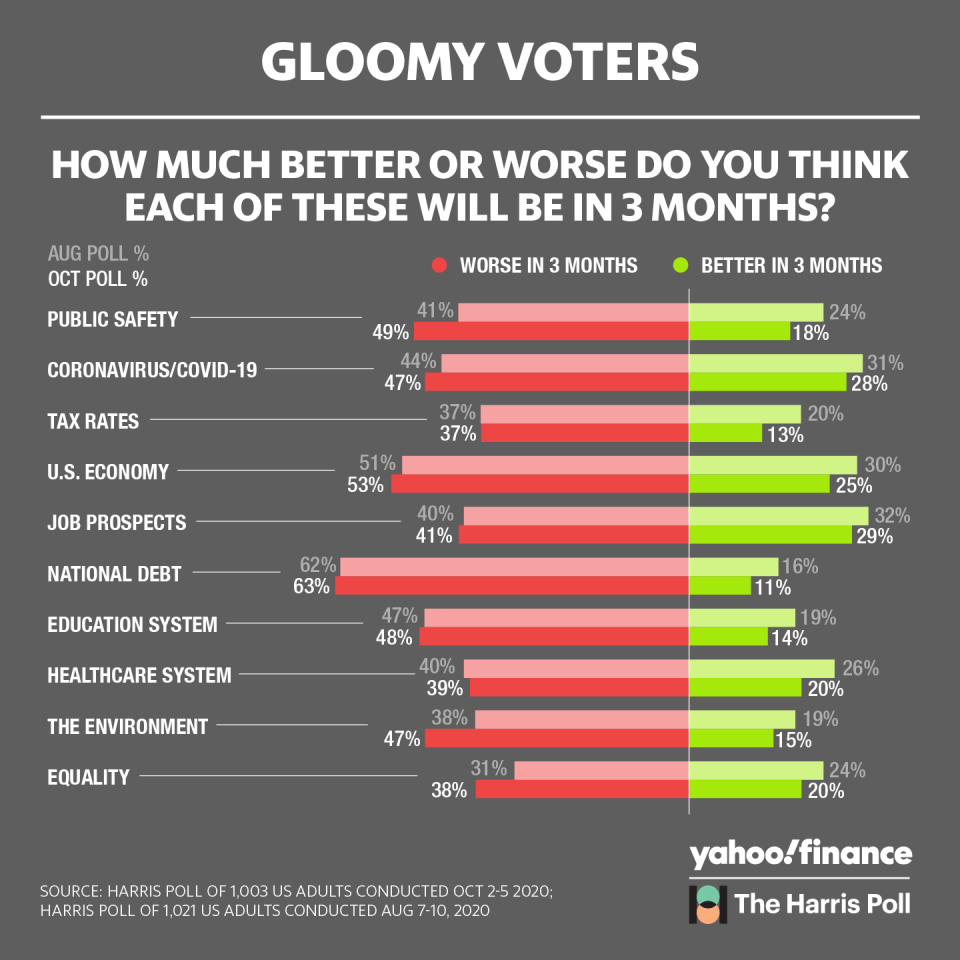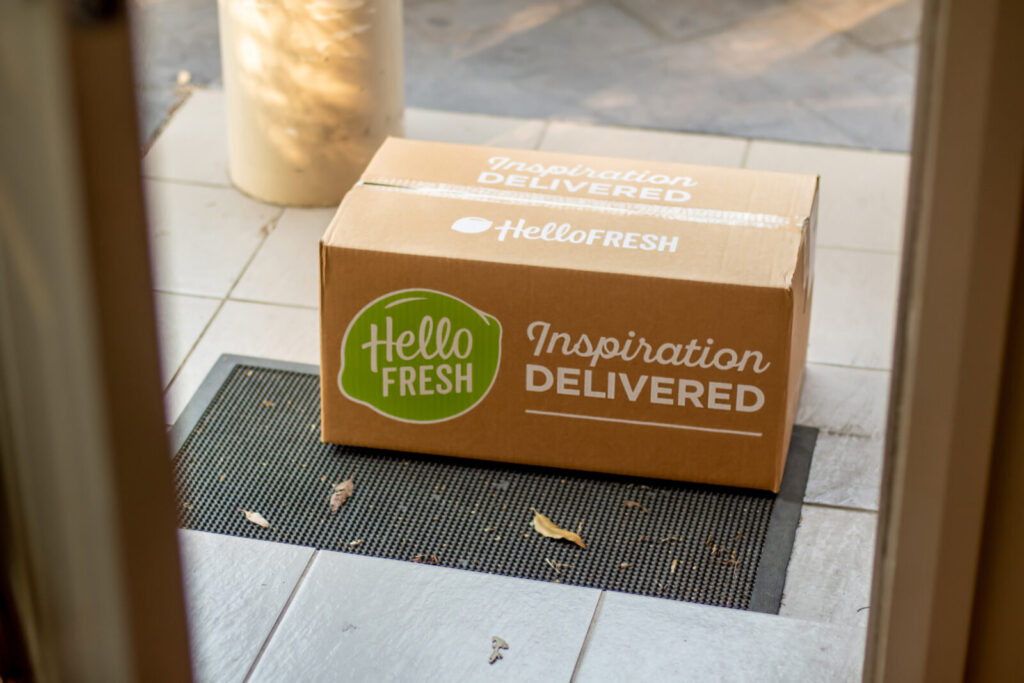Brief • 4 min Read

In The Harris Poll COVID-19 Tracker (Week 32) fielded October 1st – 3rd, 2020, we explore what the upcoming holiday shopping season will look like during the pandemic, if the NFL will survive its recent COVID scare, Americans’ views of the vice presidency and expectations for the debate, if remote work is working, and what Americans are willing to pay more in taxes for.
As a public service, our team has curated key insights to help leaders navigate COVID-19. Full survey results, tables, and weekly summaries can be accessed for free at The Harris Poll COVID-19 Portal. We will continue to actively field on a regular cadence to track the shifts in sentiment and behaviors as the news and guidelines evolve.
Bloomberg + Harris Poll Explore Holiday Spending Amid Pandemic and Tense Election
The Harris Poll new research partnership with Bloomberg finds that the 2020 election and COVID19 are aligning to suppress holiday spending. The Bloomberg Harris Poll survey released on Tuesday found more than half of U.S. shoppers say they’ll have less spending money this holiday due to the pandemic, while nearly 7 in 10 say the election makes them uncertain about the economy.

- We also found that nearly half of consumers said they plan on doing their holiday shopping entirely or mostly online. That’s up from (28%) of consumers who said the same in 2019. Just (8%) of shoppers plan to do their shopping entirely in person, down from (14%) a year ago.
- Also, more than three-fourths of consumers think retailers should encourage consumers to shop online to deter crowds on Black Friday, and just over half of Americans aren’t planning to shop at malls or department stores this year.
- Women are especially risk-averse to going into stores, with (82%) of female shoppers concerned holiday shopping crowds may spread Covid-19 compared with (75%) of men. About one in five U.S. shoppers took photos with Santa in 2019 but won’t this year, our survey shows.
Takeaway: This year we have these two forces in our way, interfering with our holiday. Throw in the virus-related recession, and you have this once-in-a-lifetime confluence of three events: the pandemic, the economic effect, and the instability of the election that’s now just casting a pall over people’s holiday planning.
The Looming NFL Crisis
After a COVID-19 outbreak caused Steelers vs Titans to be cancelled and Patriots vs Chiefs to be postponed a day this past weekend, we take a look at how fans’ expectations for the NFL season are shifting as we pass the one-quarter mark of the regular season.
- Despite players testing positive for COVID led to only two games being moved this past weekend, most Americans had already heard something about the NFL’s troubles: (61%) this past weekend were aware. However, the coveted Gen Z/Millennial audience is the least aware: (53%) have heard a great deal or some about the cancellations vs (61%) of Gen X, (64%) of Boomers, and (66%) of Seniors.
- America is undecided on the future of the NFL season: Just over one-third (36%) say they believe the NFL will be able to complete its pandemic season successfully, while a similar number (37%) say they are not sure. One-quarter (27%) do not believe the season will finish as scheduled.
- There is both a gender and generational optimism gap: (47%) of men (vs 25% of women) and (45%) of Gen Z/Millennials/(47%) of Gen Xers (vs 26% of Boomers and 20% of Seniors) think.
- There are few things Americans love more than football: just under half (45%) say the NFL should complete their season amidst the pandemic while only one-third (32%) say they should cancel the season now as a precaution.
- Both the Patriots and the Titans games are in jeopardy this upcoming weekend as players on each team continue to test positive for COVID-19. The Wall Street Journal looks at the state of the NFL as the league struggles to prevent a full-on outbreak.
Takeaway: If you think some of these findings sound familiar, it’s likely because the MLB experienced similar stumbles at the onset of its season – leading us to ask Americans similar questions about the baseball season. The NFL will need to look to its sports counterpart for guidance, as the MLB was able to regain control and just finished its regular season as scheduled. We will see if the NFL will be able to do the same, especially given the Florida governor’s announcement this week that stadiums may resume full capacity crowds.
Americans Weigh in on the Role of a Vice President
Ahead of this week’s anticipated vice presidential debate between Mike Pence and Kamala Harris, we explored how Americans view the role of the office.
- Despite what many of those who have held the office think of the role of the vice president, a large majority (83%) of Americans say they believe the role of the vice president is important. Nearly two-thirds (68%) say the vice has influence over decisions made in America.
- Perhaps Americans say the role and influence of the vice president is important because the choice influences their vote in the presidential election: (69%) of Americans say the vice presidential candidate has a great deal or some influence on their vote in a presidential election. Though both parties say the VP candidate influences their vote, Republicans (36%) are significantly more likely than Democrats (25%) to say the choice has a great deal of influence.
- Nearly half of Americans (48%) say the vice presidential debate this week will do a better job addressing policies than last week’s presidential debate, while only (12%) think it will be worse and (40%) say it will be the same.
- Speaking of debates, Americans want one by the books: (73%) say they agree the debate commission should cut off the candidate’s microphone if they break the rules and speak over their opponent. Democrats (84%) are more supportive of the rule change than Republicans (67%). Half (50%) of Americans say this rule change will make the next debate more informative and orderly, while only (28%) say it will not, and (22%) are not sure.
Takeaway: Only 37.2 million tuned in to watch the 2016 vice presidential debate, roughly half the number of people who watched the presidential debates that election season, but our data tell us this election’s vice presidential debate may be more important than ever before.
The Point of No Return to the Office
Last week, companies such as Twitter and REI announced plans to allow ‘Work from Home’ on a permanent basis and more companies are likely to follow. Are most Americans past the “point of no return” to their office … or are they eager to get back?
- Americans want (the option) to work from home: When asked if they were offered the option to work from home on a permanent basis by their employer, nearly all (85%) said they would accept it. Hybrid Option: Half (53%) would accept as long as there is work from home and office option. Never Return: (31%) would accept the offer and never return. Return: Only (15%) say they would prefer to return to the office as normal once it is safe to do so.
- Don’t Miss It! Nearly three-fifths (57%) of those who have been working from home say they do not miss the office as much as they thought they would, while 4 in 10 (43%) say they are too distracted and bored at home. Women (65%) are more likely than men (51%) to say they don’t miss the office as much as they thought they would, while Gen Z/Millennials (47%) say they are finding themselves missing the office vs only (31%) of Boomers.
- “Twitter’s plans for work from home indefinitely have prompted a wave of copycats. But its transformation has been two years in the making — and the rest of America can learn some lessons,” writes The Washington Post as they explore the shift away from the office.
Takeaway: Remote work, as with many cultural and technological trends, have been expedited by the pandemic. As companies adapt to remote workers with various rates of success, we wouldn’t be surprised if companies implement a hybrid option moving forward as a way to recruit and retain top talent as employees grow accustomed to lifestyle and location flexibility.
What Are Americans Willing to Pay Taxes For?
In an exclusive with Yahoo Finance, Amir Kanpurwala, The Harris Poll Managing Director of Brand Strategy, breaks down the findings on American sentiment on taxes leading up to the presidential election
- We asked people whether or not they think they’re getting as much in value from the government as they actually put in from paying taxes. What did we learn? Half say they are either paying about the right amount of taxes (30%), while (20%) say they are paying less than their fair share. Just over 4 in 10 (43%) say they are paying more than their fair share.
- Despite conventional wisdom, most Americans would support higher tax rates if they are used for the right reasons: three-quarters (75%) support a tax increase if it is used to ensure funding for government social services such as Social Security, Medicare, and food subsidies, while (68%) support an increase to lower the national debt.
- A Fair Tax? Two-thirds (68%) of Americans believe the U.S. income tax system should be overhauled in the years ahead to ensure the richest Americans pay more than they are currently paying in taxes. And a plurality of Americans says people and corporations that largely avoid paying taxes are cheating the system (42%) vs only (14%) say they are being smart. One-third (34%) say it is a combination of both.
- Americans are more pessimistic about the economy and COVID than they are about tax: more than half (53%) say the U.S. economy will be worse 3 months from now, while (49%) said public safety will be worse, (47%) said COVID-19 will be worse, (41%) say job prospects will be worse, and (37%) said tax rates will be worse.
- What’s driving pessimism? Amir Kanpurwala suggests the market volatility is weighing on American mindsets: “People are very concerned about the US economy and about things like having a job, issues with the health-care system, public safety, so on and so forth. I think it’s really just driven by the volatility that’s happening in the marketplace.”

Takeaway: The economic impact of the pandemic has been devastating for Americans of all ages, but has been particularly acute for near-retirees as they watch their retirement accounts depreciate or tap into their retirement savings as a lifeline. A secure retirement is part of the (new) American Dream, but the pandemic has put this out of reach for a good number of Americans.
Subscribe for more Insights
Subscribe to our newsletter for the latest trends in business, politics, culture, and more.
Download the Data
This survey was conducted online within the U.S. by The Harris Poll from October 1 to 3, 2020 among a nationally representative sample of 1,976 US. adults.
Download
Subscribe for more Insights
Subscribe to our newsletter for the latest trends in business, politics, culture, and more.
Download the Data
This survey was conducted online within the U.S. by The Harris Poll from October 1 to 3, 2020 among a nationally representative sample of 1,976 US. adults.
DownloadRelated Content








